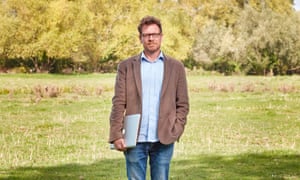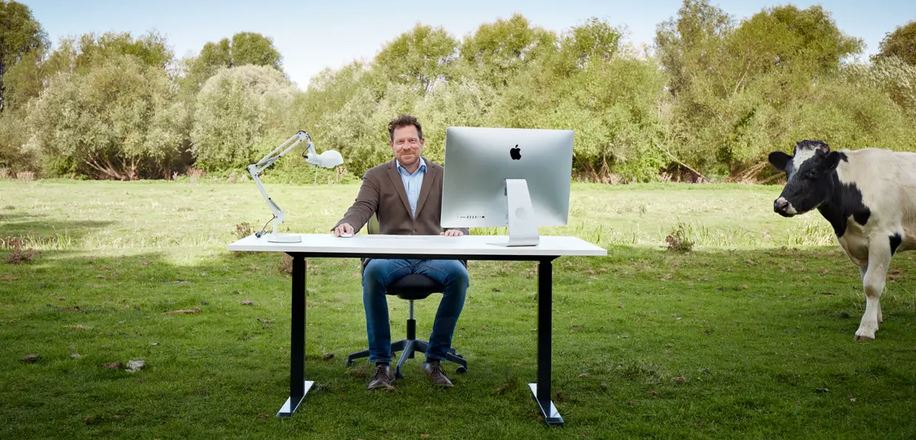Blue sky thinking: is it time to stop work taking over our lives?
Anthropologist James Suzman says now is the perfect time to rein in our unsustainable work habits. But is it possible?
Three encounters loom large in the anthropologist James Suzman’s memory of his brief but informative stint in the corporate world. The first was early on, when he told a colleague that he didn’t need to spend the half-million pounds allocated for a task because he could do it for free. His colleague was horrified. “If you don’t spend your budget,” he said, “they won’t think we’re doing anything!”
Soon afterwards, Suzman was chatting with a board director about what they’d do if they won the lottery. Suzman thought of the director’s massive townhouse and annual bonus. He was surprised when the man told him that, even with a colossal windfall, he’d continue working.
Later, the same director observed to Suzman and the rest of the senior management team that they spent more time with each other than they did with their families. He delivered the line matter-of-factly, as though it were just the way work was. But Suzman knew that it didn’t have to be.
Before he took his job, Suzman had spent some 15 years based among the Ju/’hoansi “Bushmen” of eastern Namibia, who were notable for having sustained a foraging society well into the 20th century. And while he lived among them, he witnessed first-hand how the hunter-gatherer life was far from the constant struggle for survival many of us imagine it to have been. In 1966, a landmark anthropology paper had found that the Ju/’hoansi were generally well nourished and lived long, content lives. They used the bulk of their time to rest, or have fun. Astonishingly, they spent just 15 hours a week finding food, and they stored little for the future, trusting in the surrounding desert to provide when required. Any individual surpluses were redistributed among the group. With social sanctions for selfishness and self-importance, their economy functioned in such a way as to eradicate inequality and material desires. Anthropologists concluded that the Ju/’hoansi worked almost exclusively to meet their immediate needs, beyond which their wants were few.
By contrast, in the corporate world – the world we know, where we might work 80-hour weeks largely untethered from any question of what is required and what is lusted after – our desires seem limitless, driven by an ever-escalating demand for growth and productivity.
To Suzman, the implications of this contrast were seismic. First, it suggested that the assumptions underpinning our modern economy – that we are competitive by nature, that our desires will always exceed our means – were wrong. And second, it meant that for the vast majority of our history, while we roamed the Earth as hunter-gatherers, we enjoyed more leisure time than we do today. In an age of increasing inequality, ill health, dissatisfaction and even desperation around work – and, with the coronavirus pandemic, more uncertainty than ever – it presents a hopeful thought: maybe it doesn’t have to be like this.
“Half the value of understanding hunter-gatherer society is to recognise that lots of these things that we think we are hostage to are actually not a part of our nature,” says Suzman, emphatically. “We can trace our work ethic, we can understand why we became obsessed with scarcity, we can understand why it’s different now… Maybe there are other ways of doing things.”
Our understanding of work as a means to an end has been so derailed it often feels as though we never stop working. We work for free and monetise our hobbies. We work on our bodies, our relationships, our selves. For many of us, maybe more than might like to admit it, work may be our primary identity.
It has been the driving force of my life for nearly 20 years, the unquestioned catalyst for me to move to another country or stay up all night. Given the option of a lighter load, my preference has been for slightly too much – occasionally misjudging the line.
“You’re a worker, I’m a worker,” says Suzman freely, when we meet at a café in Cambridge, where he lives. “I identify myself very much with my work. I’m actually rudderless when I’m not working; doing things like a pure leisure holiday, I find unbearable.” At its most fundamental level, says Suzman, work is the process of capturing and expending energy – so it seems fitting that he should have so much of it. He is breezy about his knowledge and persuasive in his arguments, and his mind draws links across human history just about as fast as he can express them.
Suzman looks back on his seven years in a corporate role as “fieldwork in big business”. But he still seems to feel conflicted about the experience, not least when he tells me who he worked for: the diamond-mining giant De Beers.
He joined in 2007 as its global director of public affairs, wooed by its talk of wanting to go green and give back. Under his leadership, the company was repeatedly recognised by the industry for its sustainability-reporting practices and environmental and social performance. As an anthropologist, Suzman learned the company culture and quickly scaled its ranks, “But the longer I was there, the more I internalised it,” he says. “I began to dislike myself terribly, sitting there thinking: ‘How’s my bonus going to look this year?’”
During the 2009 recession, De Beers’s profits plum meted 99%, forcing a company restructure and redundancies that gutted his team. “I was just miserable,” he says. Suzman ended up walking out of the job in 2013. “It was one of the happiest days of my life, marching out of there – and then I went straight back to the Kalahari.”

He set up the Anthropos think-tank, offering anthropological approaches to present-day problem-solving (at a corporate rate of up to £1,400 per day – half for NGOs), and later wrote a book, Affluence Without Abundance, about what the western world could learn from the Bushmen.
Suzman says his time at De Beers taught him to empathise. “It’s really easy to make a caricature of business people, but they’re cultural creatures – we all try to establish meaning and legitimacy around what we do with our lives.”
Many of us are unsuccessful. In a 2015 YouGov survey, 37% of Britons said their work did not meaningfully contribute to the world. In 2017, a Gallup poll of 155 counties found that only one in 10 western Europeans described themselves as engaged by their jobs. This has been framed as a workplace issue – actually, says Suzman, “it is a problem with the nature of work”. It reflects the 20th century boom in what the late anthropologist David Graeber dubbed “bullshit jobs”, creating work for work’s sake. From “human relations” departments that exist to improve attitudes to work and with it productivity, to pay and bonus structures to further favour top earners, Suzman says there has emerged “a whole class of people who were utterly invested in this idea that they were actually creating value”. The key to corporate success is convincing everyone else you’re important and worthwhile, as Suzman learned for himself at De Beers.
“You developed vast bureaucracies which were ultimately pointless, but that was the skill: the bigger your bureaucracy, the more power you wielded and the more important you became. I established this vast empire – I don’t think it made a jot of difference to anything when I got out.”
For a self-identifying worker, it was an important reminder: if work is a transaction of energy, our own is finite.
Not long ago, we dreamed of being liberated from work altogether. In 1930, the economist John Maynard Keynes imagined a future in which technological innovation, efficiency gains and long-term capital growth might usher in a “golden age of leisure” in which we could satisfy our needs by working no more than 15 hours a week.
But a century of efforts to reduce work disappeared after the Second World War. Though labour productivity has increased roughly four- or five-fold in industrialised nations since then, average weekly working hours have remained stubborn at just under 40 hours a week. This is in part a result of our innate drive to keep ourselves occupied, says Suzman: “People like to be busy. This is an absolute fundamental thing: we like to be skilled, we like to whittle, we like to carve.”
In his new book, Work: A History of How We Spend Our Time, Suzman takes a discursive path through millennia of milestones to trace our contemporary relationship to work – and concludes that the problem is a “very simple set of assumptions about human nature, which are clearly and demonstrably wrong”.
Chief among them is our preoccupation with scarcity – a hangover from the early agricultural state some 12,000 years ago, when we went from foragers to farmers. Somewhat paradoxically, in being able to cultivate and store food, we became fixated on the possibility we might not have enough – even as our productivity was turbo-charged by the agricultural and industrial revolutions.
The necessity – not to mention, moral good – of hard work was a cultural mantra that became hardwired over time, and persisted even as the driver switched from survival to financial capital. The emergence of cities 8,000 years ago created a whole new kind of work driven not by our material needs – those were met by farmers – but by desires: for status, pleasure, wealth and power.
“Greed became institutionalised with cities,” says Suzman. Our new physical proximity to wealth also exacerbated our anxiety over scarcity, focusing our minds on how we were lacking. “Suddenly there was now this confrontation, this contrast in wealth, and I think that began to shape people. It created this melancholy of constant aspiration.”
Signs of this are everywhere, says Suzman, from grand country-house gates in front of a humble semi-detached to the global trade in counterfeit luxury goods. Social media works as an “ostentation-amplifier”, reassuring ourselves of our success but further escalating our material desires.
“As a species, when we see inequality, we try to either level it down, which is what the Bushman approach was – or we try to level up to it,” says Suzman. We may not even be conscious of the path we’ve chosen, with people routinely underestimating the extent of material inequality in their home countries.
A recent report by Tax Justice found that Britons think accumulating wealth is positive and morally right, and are broadly supportive of the ultra-rich, believing them to have been rewarded for sacrifice and ambition. Tellingly, even the ultra-rich have not made it off the treadmill, tending to work longer hours and spend less time on leisure. But growth has become such an obsession, says Suzman, that, “We now spend most of our energy doing utterly pointless things” – which is damaging not only to our health but to that of the planet through emissions. As an ex-smoker, Suzman likens it to a nicotine addiction. “We pump crap into the atmosphere. It doesn’t make us happy. I can’t work out who benefits.”
As Suzman is talking, I consider work as the source of both my greatest satisfactions and my most miserable lows. I’d continue to do my job, and maybe even to periodically burn out, even if I had no material need to do so. My relationship to work may be the most significant in my life – but I am often made uncomfortably aware that the feeling isn’t mutual.
For me, I tell Suzman – as I have told successive therapists, and with no small sadness – the hollowness emerges from a system that makes it seem both joyless and endless. “It’s that at the moment,” he agrees. “But it’s that feeling that makes me vaguely optimistic that we won’t put up with this any more.”
In just six months, coronavirus has underscored much of what wasn’t working about work, and created the opportunity for change. “Essential workers” have been celebrated and revealed to be undervalued and underpaid. The successful switch to working from home may make punishing commutes – or even inner-city business districts – a thing of the past. Social media has abandoned “every day I’m hustling” in favour of a new catch cry: “You don’t have to be productive during a pandemic.” And the furlough scheme opened many people’s eyes to how the economy could be put to work for everybody. Support for once-fringe ideas that might redress a work-life balance skewed beyond proportion, such as a universal basic income (UBI) or a four-day week, has been voiced even from conservative corners.
It is proof to Suzman that as “stupidly intransigent” as humans can be with regards to culture, “they do change when change is forced upon them” – a hopeful thought for the looming climate crisis. What we must do now, Suzman says, is to seize the opportunity to explore new approaches to organising capital.
“We know that there’s a problem: there’s the environmental aspect, the misery aspect. What we have to do is acknowledge that we actually have these problems… and take experimentation seriously.” Trialling a UBI, or ways of turning office blocks into housing, are two such possible steps towards a “future world order”, says Suzman. We are, after all, unable to go back.
Even the Ju/’hoansi could not return to a hunter-gatherer economy today, says Suzman, but; “I think an economy based on abundance is a cultural possibility, and a choice.” The Ju/’hoansi view of the world as “fundamentally a sharing place… cascaded through everything about their society,” he says. “There’s a recognising that when you take things out of a hierarchy, there’s a great deal more freedom.”
In imagining a new way to work, we might start by asking ourselves if our desires really are infinite – and what we are prepared to pay for them. Suzman is hopeful. “I don’t know anybody with infinite desires,” he says. “I think for most people, they’re pretty modest.”
Source:https://www.theguardian.com/money/2020/oct/04/blue-sky-thinking-is-it-time-to-stop-work-taking-over-our-lives?utm_term=a92b4d07a791ec918718fc68f68ccce7&utm_campaign=GuardianTodayUK&utm_source=esp&utm_medium=Email&CMP=GTUK_email




